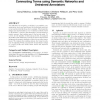Free Online Productivity Tools
i2Speak
i2Symbol
i2OCR
iTex2Img
iWeb2Print
iWeb2Shot
i2Type
iPdf2Split
iPdf2Merge
i2Bopomofo
i2Arabic
i2Style
i2Image
i2PDF
iLatex2Rtf
Sci2ools
ASSETS
2009
ACM
2009
ACM
Better vocabularies for assistive communication aids: connecting terms using semantic networks and untrained annotators
The difficulties of navigating vocabulary in an assistive communication device are exacerbated for individuals with lexical access disorders like those due to aphasia. We present the design and implementation of a vocabulary network based on WordNet, a resource that attempts to model human semantic memory, that enables users to find words easily. To correct for the sparsity of links among words, we augment WordNet with additional connections derived from human judgments of semantic similarity collected in an online experiment. We evaluate the resulting system, the visual vocabulary for aphasia (ViVA), and describe its potential to adapt to a user’s profile and enable faster search and improved navigation. Categories and Subject Descriptors K.4.2 [Computers and Society]: Social Issues—Assistive technologies for persons with disabilities; H.5.2 [Information Interfaces and Presentation]: User Interfaces General Terms Human Factors, Design, Experimentaton Keywords Assistive Communic...
| Added | 22 Jul 2010 |
| Updated | 22 Jul 2010 |
| Type | Conference |
| Year | 2009 |
| Where | ASSETS |
| Authors | Sonya S. Nikolova, Jordan L. Boyd-Graber, Christiane Fellbaum, Perry R. Cook |
Comments (0)

